Laughing Bill Hyde and Other Stories by Rex Beach (ebook smartphone .TXT) 📗

- Author: Rex Beach
Book online «Laughing Bill Hyde and Other Stories by Rex Beach (ebook smartphone .TXT) 📗». Author Rex Beach
"Bob!" cried the other, in shocked denial.
"Oh, you know it will come to that. People don't like to feel pity forever tugging at them. I've been a lonely fellow and my friends are numbered. For a time they will come to see me, and try to cheer me up; they will even try to include me in their pleasures; then when it is no longer a new story and their commiseration has worn itself out they will gradually fall away. It always happens so. I'll be 'poor Bob Austin,' and I'll go feeling my way through life an object of pity, a stumbling, incomplete thing that has no place to fill, no object to work for, no one to care. God! I'm not the sort to go blind! Where's the justice of it? I've lived clean. Why did this happen to me? Why? Why? I know what the world is; I've been a part of it. I've seen the spring and the autumn colors and I've watched the sunsets. I've looked into men's faces and read their souls, and when you've done that you can't live in darkness. I can't and—I won't!"
"What do you mean?"
"I'm going away."
"When? Where?"
"When I can no longer see Marmion Moore and before my affliction becomes known to her. Where—you can guess."
"Oh, that's cowardly, Bob! You're not that sort. You mustn't! It's unbelievable," his friend cried, in a panic.
Austin smiled bitterly. "We have discussed that too often, and—I'm not sure that what I intend doing is cowardly. I can't go now, for the thing is too fresh in her memory, she might learn the truth and hold herself to blame; but when she has lost the first shock of it I shall walk out quietly and she won't even suspect. Other interests will come into her life; I'll be only a memory. Then—" After a pause he went on, "I couldn't bear to see her drop away with the rest."
"Don't give up yet," urged the physician. "She is leaving for the summer, and while she is gone we'll try that Berlin chap. He'll be here in August."
"And he will fail, as the others did. He will lecture some clinic about me, that's all. Marmion will hear that my eyes have given out from overwork, or something like that. Then I'll go abroad, and—I won't come back." Austin, divining the rebellion in his friend's heart, said, quickly: "You're the only one who could enlighten her, Doc, but you won't do it. You owe me too much."
"I—I suppose I do," acknowledged Suydam, slowly. "I owe you more than
I can ever repay—"
"Wait—" The sick man raised his hand, while a sudden light blazed up in his face. "She's coming!"
To the doctor's trained ear the noises of the street rose in a confused murmur, but Austin spoke in an awed, breathless tone, almost as if he were clairvoyant.
"I can hear the horses. She's coming to—see me."
"I'll go," exclaimed the visitor, quickly, but the other shook his head.
"I'd rather have you stay."
Austin was poised in an attitude of the intensest alertness, his angular, awkward body was drawn to its full height, his lean face was lighted by some hidden fire that lent it almost beauty.
"She's getting out of the carriage," he cried, in a nervous voice; then he felt his way to his accustomed arm-chair. Suydam was about to go to the bay-window when he paused, regarding his friend curiously.
"What are you doing?"
The blind man had begun to beat time with his hand, counting under his breath: "One! Two! Three!—"
"She'll knock when I reach twenty-five. 'Sh! 'sh!" He continued his pantomime, and Suydam realized that from repeated practice Austin had gauged to a nicety the seconds Marmion Moore required to mount the stairs. This was his means of holding himself in check. True to prediction, at "Twenty-five" a gentle knock sounded, and Suydam opened the door.
"Come in, Marmion."
The girl paused for the briefest instant on the threshold, and the doctor noted her fleeting disappointment at seeing him; then she took his hand.
"This is a surprise," she exclaimed. "I haven't seen you for ever so long."
Her anxious glance swept past him to the big, awkward figure against the window's light. Austin was rising with apparent difficulty, and she glided to him.
"Please! Don't rise! How many times have I told you not to exert yourself?"
Suydam noted the gentle, proprietary tone of her voice, and it amazed him.
"I—am very glad that you came to see me." The afflicted man's voice was jerky and unmusical. "How are you to-day, Miss?"
"He shouldn't rise, should he?" Miss Moore appealed to the physician.
"He is very weak and shouldn't exert himself."
The doctor wished that his friend might see the girl's face as he saw it; he suddenly began to doubt his own judgment of women.
"Oh, I'm doing finely," Austin announced. "Won't you be seated?" He waved a comprehensive gesture, and Suydam, marveling at the manner in which the fellow concealed his infirmity, brought a chair for the caller.
"I came alone to-day. Mother is shopping," Miss Moore was saying. "See! I brought these flowers to cheer up your room." She held up a great bunch of sweet peas. "I love the pink ones, don't you?"
Austin addressed the doctor. "Miss Moore has been very kind to me; I'm afraid she feels it her duty—"
"No! No!" cried the girl.
"She rarely misses a day, and she always brings flowers. I'm very fond of bright colors."
Suydam cursed at the stiff formality in the man's tone. How could any woman see past that glacial front and glimpse the big, aching heart beyond? Austin was harsh and repellent when the least bit self-conscious, and now he was striving deliberately to heighten the effect.
The physician wondered why Marmion Moore had gone even thus far in showing her gratitude, for she was not the self-sacrificing kind. As for a love match between two such opposite types, Suydam could not conceive of it. Even if the girl understood the sweet, simple nature of this man, even if she felt her own affections answer to his, Suydam believed he knew the women of her set too well to imagine that she could bring herself to marry a blind man, particularly one of no address.
"We leave for the mountains to-morrow," Marmion said, "so I came to say good-by, for a time."
"I—shall miss your visits," Austin could not disguise his genuine regret, "but when you return I shall be thoroughly recovered. Perhaps we can ride again."
"Never!" declared Miss Moore. "I shall never ride again. Think of the suffering I've caused you. I—I—am dreadfully sorry."
To Suydam's amazement, he saw the speaker's eyes fill with tears. A doubt concerning the correctness of his surmises came over him and he rose quickly. After all, he reflected, she might see and love the real Bob as he did, and if so she might wish to be alone with him in this last hour. But Austin laughed at his friend's muttered excuse.
"You know there's nobody waiting for you. That's only a pretense to find livelier company. You promised to dine with me." To Miss Moore he explained: "He isn't really busy; why, he has been complaining for an hour that the heat has driven all his patients to the country, and that he is dying of idleness."
The girl's expression altered curiously. She shrank as if wounded; she scanned the speaker's face with startled eyes before turning with a strained smile to say:
"So, Doctor, we caught you that time. That comes from being a high-priced society physician. Why don't you practise among the masses? I believe the poor are always in need of help."
"I really have an engagement," Suydam muttered.
"Then break it for Mr. Austin's sake. He is lonely and—I must be going in a moment."
The three talked for a time in the manner all people adopt for a sick-room, then the girl rose and said, with her palm in Austin's hand:
"I owe you so much that I can never hope to repay you, but you—you will come to see me frequently this season. Promise! You won't hide yourself, will you?"
The blind man smiled his thanks and spoke his farewell with meaningless politeness; then, as the physician prepared to see her to her carriage, Miss Moore said:
"No! Please stay and gossip with our invalid. It's only a step."
She walked quickly to the door, flashed them a smile, and was gone.
Suydam heard his patient counting as before.
"One! Two! Three—!"
At "Twenty-five" the elder man groped his way to the open bay-window and bowed at the carriage below. There came the sound of hoofs and rolling wheels, and the doctor, who had taken stand beside his friend, saw Marmion Moore turn in her seat and wave a last adieu. Austin continued to nod and smile in her direction, even after the carriage was lost to view; then he felt his way back to the arm-chair and sank limply into it.
"Gone! I—I'll never be able to see her again."
Suydam's throat tightened miserably. "Could you see her at all?"
"Only her outlines; but when she comes back in the fall I'll be as blind as a bat." He raised an unsteady hand to his head and closed his eyes. "I can stand anything except that! To lose sight of her dear face—" The force of his emotion wrenched a groan from him.
"I don't know what to make of her," said the other. "Why didn't you let me go, Bob? It was her last good-by; she wanted to be alone with you. She might have—"
"That's it!" exclaimed Austin. "I was afraid of myself; afraid I'd speak if I had the chance." His voice was husky as he went on. "It's hard—hard, for sometimes I think she loves me, she's so sweet and so tender. At such times I'm a god. But I know it can't be; that it is only pity and gratitude that prompts her. Heaven knows I'm uncouth enough at best, but now I have to exaggerate my rudeness. I play a part—the part of a lumbering, stupid lout, while my heart is breaking." He bowed his head in his hands, closing his dry, feverish eyes once more. "It's cruelly hard. I can't keep it up."
The other man laid a hand on his shoulder, saying: "I don't know whether you're doing right or not. I half suspect you are doing Marmion a bitter wrong."
"Oh, but she can't—she can't love me!" Austin rose as if frightened. "She might yield to her impulse and—well, marry me, for she has a heart of gold, but it wouldn't last. She would learn some time that it wasn't real love that prompted the sacrifice. Then I should die."
The specialist from Berlin came, but he refused to operate, declaring bluntly that there was no use, and all during the long, hot summer days Robert Austin sat beside his open window watching the light die out of the world, waiting, waiting, for the time to make his sacrifice.
Suydam read Marmion's cheery letters aloud, wondering the while at the wistful note they sounded now and then. He answered them in his own handwriting, which she had never seen.
One day came the announcement that she was returning the first week in October. Already September was partly gone, so Austin decided to sail in a week. At his dictation Suydam wrote to her, saying that the strain of overwork had rendered a long vacation necessary. The doctor writhed internally as he penned the careful sentences, wondering if the hurt of the deliberately chosen words would prevent her sensing the truth back of them. As days passed and no answer came he judged it had.
The apartment was stripped and bare, the trunks were packed on the afternoon before Austin's departure. All through the dreary mockery of the process the blind man had withstood his friend's appeal, his stern face set, his heavy heart full of a despairing stubbornness. Now, being alone at last, he groped his way about the premises to fix them in his memory; then he sank into his chair beside the window.
He heard a knock at the door and summoned the stranger to enter, then he rose with a gasp of dismay. Marmion Moore was greeting





Comments (0)